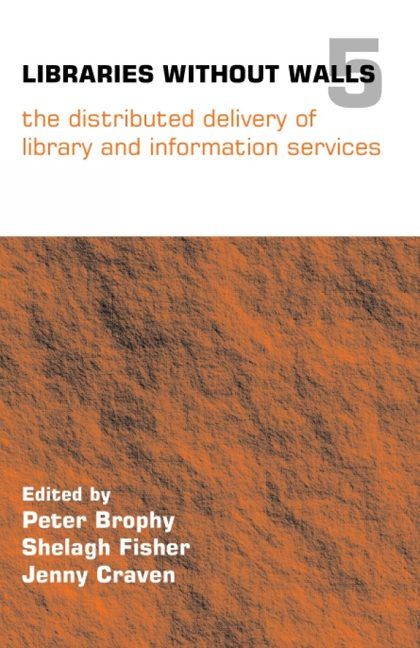Book contents
- Frontmatter
- Contents
- Contributors
- 1 Introduction
- 2 Keynote paper: beyond the mainstream of library services
- THEME 1 THE INTEGRATION OF LIBRARY SERVICES AND VIRTUAL LEARNING ENVIRONMENTS
- 3 Staff without walls: developing library and information staff for e-learning
- 4 Supporting information-based networks in higher education
- 5 Library services and virtual learning: the DEViL project
- 6 Virtual learning and teaching resources: the library as a collaborator
- 7 Virtual learning environments and Greek academic libraries
- THEME 2 THE RELATIONSHIP BETWEEN USER NEEDS, INFORMATION SKILLS AND INFORMATION LITERACIES
- THEME 3 USABILITY AND ACCESSIBILITY OF DIGITAL LIBRARY SERVICES
- THEME 4 DESIGNING THE INFORMATION ENVIRONMENT: NATIONAL AND INSTITUTIONAL PERSPECTIVES
- THEME 5 THE CREATION OF DIGITAL RESOURCES BY USER COMMUNITIES
- Index
- Miscellaneous Endmatter
- Miscellaneous Endmatter
- misc-endmatter
- Miscellaneous Endmatter
4 - Supporting information-based networks in higher education
from THEME 1 - THE INTEGRATION OF LIBRARY SERVICES AND VIRTUAL LEARNING ENVIRONMENTS
Published online by Cambridge University Press: 08 June 2018
- Frontmatter
- Contents
- Contributors
- 1 Introduction
- 2 Keynote paper: beyond the mainstream of library services
- THEME 1 THE INTEGRATION OF LIBRARY SERVICES AND VIRTUAL LEARNING ENVIRONMENTS
- 3 Staff without walls: developing library and information staff for e-learning
- 4 Supporting information-based networks in higher education
- 5 Library services and virtual learning: the DEViL project
- 6 Virtual learning and teaching resources: the library as a collaborator
- 7 Virtual learning environments and Greek academic libraries
- THEME 2 THE RELATIONSHIP BETWEEN USER NEEDS, INFORMATION SKILLS AND INFORMATION LITERACIES
- THEME 3 USABILITY AND ACCESSIBILITY OF DIGITAL LIBRARY SERVICES
- THEME 4 DESIGNING THE INFORMATION ENVIRONMENT: NATIONAL AND INSTITUTIONAL PERSPECTIVES
- THEME 5 THE CREATION OF DIGITAL RESOURCES BY USER COMMUNITIES
- Index
- Miscellaneous Endmatter
- Miscellaneous Endmatter
- misc-endmatter
- Miscellaneous Endmatter
Summary
Introduction
With the development of information and communications technologies (ICTs) classic library practice has become digitized and at the same time has evolved into the practice of information skills. Digitizing practice has greatly increased the quality of instruction. Apart from the standard advantages that employing ICT brings, such as improved facilities at the work place, speed and time independence, the biggest advantage could be the potential to demonstrate exactly how different library systems work, from information seeking to lending. It is possible to serve users by offering them the necessary skills to approach library systems properly and to make their visits to libraries more successful. Many good examples of such programmes, the so called self-explanatory libraries, are available nowadays – for example, the Wageningen Desktop Library (http://library.wur.nl/ desktop/direct/), The Personal Composer (http://search.library.tudelft.nl/pcom/) (both from The Netherlands), LUMINA (www.lib.umn.edu/), The Data Genie (www.lib.calpoly.edu/research/data_genie.html) and, of course, MetaLib (www. exlibris.co.il/metalib/overview.html). With the rise of electronic learning environments, however, one is forced to proceed a stage further. This is a move from information skills to ‘dealing with’ digital scientific material. ‘Dealing with’ implies more than ‘possessing skills’. It involves working according to the rules and methods that determine the exchange of scientific knowledge. The question is no longer how to understand the library system or even how to use it, but knowing how to deal with scientific material as it presents itself through the e-platform both socially and with respect to content. By ‘socially’ we mean that through use of the e-platform it is possible to engage with the scientific network that provides information, which enables us to evaluate it. Dealing with the content of scientific material means that it is now possible to have direct access to the information itself so the information has great influence. Thus, in order to make the package of library functions compatible with and work with an e-platform, the library will need to develop new forms of service and interactive systems that contribute to the possibility of being at the right knowledge centre at the right moment.
- Type
- Chapter
- Information
- Libraries Without Walls 5The Distributed Delivery of Library and Information Services, pp. 31 - 48Publisher: FacetPrint publication year: 2004

